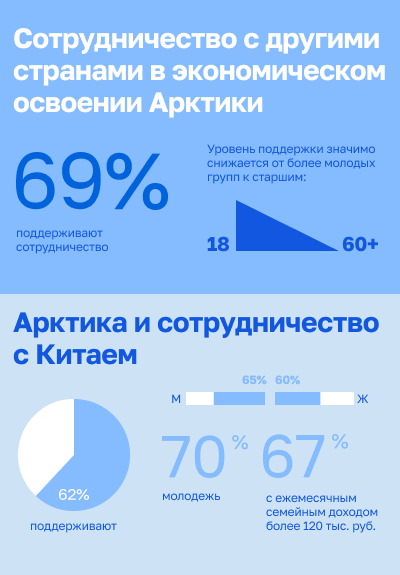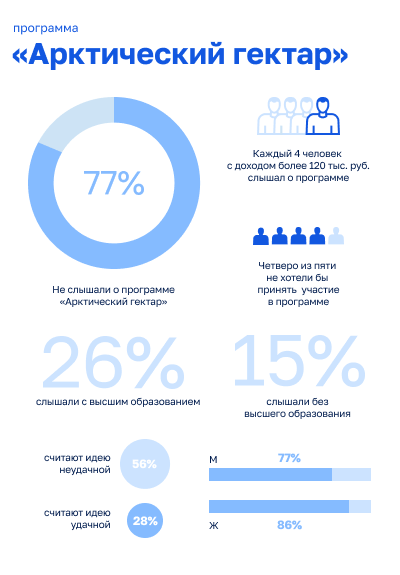![[object Object],[object Object]](https://cdn.sanity.io/images/tsza235h/production/d5484e899225afbdefd24f9caa29fc1c8516f1d5-1360x765.jpg?w=3840&h=2160&fit=max&auto=format)
Что россияне знают о современной Арктике?
Arctida и Russian Fields выяснили, что известно россиянам о действиях государства в Арктике, какие из них и почему они готовы поддержать.
В ближайшие годы Арктика может столкнуться с серьёзными климатическими и геополитическими вызовами. Государство ищет пути решения этих кризисов – но поддержат ли их люди? Arctida и Russian Field решили выяснить, что вообще россияне знают о госполитике в Арктике, какой хотят её видеть – и выявили поколенческий раскол. Старшее поколение чаще воспринимает регион как источник ресурсов, поддерживает его использование в военных целях и опасается сотрудничества с не «дружественными странами». Молодые реже поддерживают добычу ресурсов и гораздо меньше – изоляционизм и милитаризм.
Почему важно держать Арктику в фокусе внимания?
Российские власти часто говорят о важности развития Арктики, тратят значительные ресурсы на программы по освоению её территории. В ближайшее время этот регион может столкнуться с новыми вызовами. Таяние ледников открывает доступ к полезным ископаемым – в Арктике сосредоточено около 22% мировых неразведанных ресурсов углеводородов. Но вместе с тем исчезновение льда грозит катастрофой для природной среды и её обитателей.
Растёт и геополитическое напряжение. Российские власти опасаются роста военного присутствия НАТО у границ, в том числе в связи со вступлением Финляндии и Швеции в Североатлантический альянс. Недавно в Госдуме подтвердили возможность денонсации Конвенции ООН по морскому праву в части Арктики – документа, который регулирует вопросы национальных границ, судоходства и добычи ресурсов в регионе.
Что россияне слышали об Арктике в последнее время?
Arctida и Russian Fields выяснили, что известно россиянам о действиях государства в Арктике, какие из них и почему они готовы поддержать. Больше половины опрошенных за последние три месяца вообще не встречали упоминаний об Арктике в медиа и соцсетях.
Впрочем, 44% респондентов заявили, что замечали публикации по этой теме. Чаще они были связаны с освоением региона и его историей (15,2%), чуть реже – с экологическими проблемами (12,0%). Примерно по 9% встречали упоминания о геополитической борьбе за Арктику, северном морском пути, атомном флоте и ледоколах.


Политическая по вестка в Арктике
Размещение в Арктике войск и военных объектов поддерживают только 53%.

Опрошенные по-разному относятся к возможным направлениям деятельности в Арктике. Развитие северного морского пути поддерживают 85% респондентов, туризма – 73%, заботу об экологии региона – 77%. За использование региона для добычи полезных ископаемых выступают 69% респондентов.
Политическая повестка – «поворот на Восток» – сильнее всего отразилась на вопросе о возможности сотрудничества с другими странами в освоении Арктики. В целом такое сотрудничество поддерживают 69%. При этом 37% считают, что взаимодействовать можно только с «дружественными» странами: Китаем, Индией и другими. Отдельно сотрудничество с Китаем одобряют 62% респондентов. А 28% уверены, что страна справится с освоением Арктики без чьей-либо помощи. Четверть опрошенных допускают сотрудничество не только с «дружественными» арктическими странами.

Невостребованный «Арктический гектар»
О госпрограмме «Гектар в Арктике» ничего не слышало подавляющее большинство опрошенных (78%). Что-либо знают о ней только 21%. Причем более 80% из них заявили, что не готовы в ней участвовать. Более половины респондентов признали саму идею неудачной.
Эксперты, которые работают с Arctida, объясняют непопулярность программы отсутствием инфраструктуры, недоступностью территории в целом, суровым климатом и ограниченным выбором сфер, для которых может пригодиться гектар в данном регионе.
Молодые против изоляции и милитаризма
В том, какой россияне хотят видеть Арктику, наметился поколенческий разрыв. Молодых людей больше заботит экология региона. Среди опрошенных в возрасте 18 – 29 лет об этом заявили 78%, в группе старше 60 лет – 71%.

Респонденты до 30 лет меньше поддерживают добычу полезных ископаемых в Арктике: 63% в группе 18 – 29 лет против 75% в группе старше 60 лет. Также они охотнее выступают за сотрудничество с другими странами в освоении Арктики. Среди людей в возрасте 18 – 29 лет за самостоятельное освоение региона высказались лишь 17%. В группе 45-59 лет таких уже 34%.
Молодые гораздо меньше хотят видеть в Арктике военные объекты: в группе 18 – 29 лет это поддерживают лишь 38,3%, в следующей группе до 44 лет – уже 48,1%, а среди людей старше 60 лет – 62,4%.
На позицию опрошенных влияет также их благосостояние и образование. Так, вместе с уровнем дохода растёт поддержка экологической работы в Арктике и сотрудничества с другими странами. Готовность использовать Арктику в военных целях, наоборот, снижается среди респондентов с более высоким доходом. Люди без высшего образования чаще поддерживают размещение военных объектов в Арктике и реже – сотрудничество с другими странами и заботу об экологии региона.
Эксперты Arctida видят запрос на укрепление бренда «Арктики»
По мнению экспертов, с которыми работает Arctida, итоги опросов об упоминаниях Арктики показывают, что у региона нет своего сильного «бренда». Респонденты следуют за повесткой в медиа. Так, они вспоминают об экологических проблемах из-за сообщений о катастрофах. А геополитическая и военная тематика на слуху из-за продолжающейся военной агрессии России в Украине и усиления блока НАТО на приграничных территориях в Арктике. Сама арктическая повестка остаётся размытой.
Готовы ответить на ваши вопросы, предоставить комментарии и материалы по нашему исследованию. Обращайтесь по адресу для сотрудничества и обмена знаниями.
Противоречия среди возрастных групп по экологическими и военным вопросам могут свидетельствовать о поколенческом расколе в способах получения информации. Старшее поколение использует традиционные медиа и воспринимает транслируемые там государственные нарративы. Как следствие, эти люди охотнее поддерживают курс на изоляцию, милитаризм и видят Арктику как источник ресурсов. Опрошенные в возрасте до 30 лет получают информацию из новых медиа, свободных от государственных нарративов. Поэтому молодые чаще хотят видеть Арктику туристически привлекательным и мирным регионом.
Исследование проводилось методом телефонного опроса среди жителей России с 4 по 12 декабря 2023 года. Участие приняли 1600 респондентов. Выборка репрезентативна по полу, возрасту в рамках РФ и федеральных округов в частности. Вероятность ошибки не превышает 2,45%.
Мы готовы ответить на ваши вопросы, предоставить дополнительные комментарии и материалы. Пишите на [email protected] для обмена знаниями и сотрудничества.



